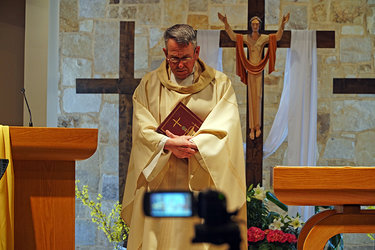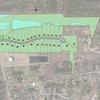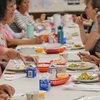Coronavirus forces a lenten desert
VOORHEESVILLE — The week before Easter is the holiest week of the year for Christians. “Part of our faith is fasting and walking with Jesus in the desert, separated from the things we love so we can have a better appreciation when we have them,” says Christopher DeGiovine, the priest at St. Matthew’s Church in Voorheesville.
“The virus,” he said, “of the coronavirus pandemic, “is forcing us to a lenten desert experience none of us would have chosen. It will help us to know our hungers — for gathering, for resurrection, and a new life.”
Unfortunately, DeGiovine said, that won’t be happening on Easter Sunday. “It looks like Easter will be sometime in the summer,” he said, referencing a time when the coronavirus may have peaked and declined so that restrictions can be lifted.
“It won’t be this Sunday,” he said. “It will be for sure … That’s the promise of the Lord. We wait together.”
Since 2012, DeGiovine has been the pastor of St. Matthew’s Church, which serves 1,000 families. He used to conduct three Masses weekly, with about 200 people at each Mass.
He celebrated his last Mass with congregants in attendance on March 15. “The crowds were down about half because people were getting nervous,” he said. Albany County had announced its first two confirmed cases of COVID-19 on March 12. “We had nothing on the 22nd,” said DeGiovine.
On March 29, the church began videotaping services. DeGiovne said he is grateful for the “phenomenal musicians” and people capable with technology in his congregation.
While New York’s governor has, by executive order, declared no more than 10 people can gather at once, the Albany Diocese has stricter rules, said DeGiovine: “Only six people can be in the church at a time,” he said.
So, to film the services, there is an organist, a cantor, a reader, perhaps another singer or another reader, DeGiovine, and a camera person.
For the Easter service, there will be two separate videos that will be merged with six people providing the music in one taping and six people providing the service in another.
The videos are posted on Youtube and parishioners can then click on a link on the church’s website to view them. St. Matthew’s Church decided to do it this way, rather than livestreaming the service, so that parishioners can watch at any time, DeGiovine said.
In the Palm Sunday service at St. Matthew’s Church, DeGiovine tells his congregation, “During this difficult time in our lives as we are physically separate from our family, friends, and each other, we have a particular opportunity to spend time alone with Christ in this holiest of weeks. Let us take this time as an opportunity to grow in our relationship with and love of Jesus Christ. Through him, with him, and in him we will rise again from this dark and painful time just as he did from the cross.”
“It’s painful,” DeGiovine told The Enterprise of not gathering together for Mass. “It’s painful for me. It’s painful for them.”
It took DeGiovine a while to get used to preaching to an empty church, he said, as he greatly values the response from and interaction with his parishioners. “Liturgy is a community event,” he said. “It’s an experience. You have to be there.”
But, he went on, “We’re learning about our deepest hungers … the hunger to be together, the hunger for a hug and a kiss. We’re learning, too, about some of the beautiful pieces of new technology. The good and the bad.”
The Albany Diocese, which regularly updates its website with coronavirus guidelines, says this: “As of March 22, 2020, at 8 p.m., in accordance with the governor’s executive order, the Diocese announced that all public liturgies are canceled until further notice. This includes baptisms, funerals, and weddings … Parishes are permitted to livestream Masses in order to provide spiritual support to the faithful. During livestreamed liturgies, the doors to the church will be locked to prevent people from gathering.”
“Some priests have put the entire Mass on the film,” said DeGiovine. “I strongly believe communion needs people present. I do the liturgy of the Word … We read from the Bible, sing and pray together. I give the homily.”
He went on about the coronavirus restrictions, “The hardest part — it’s breaking my heart and breaking their hearts — is I can’t visit nursing homes. I can’t visit hospitals. I can’t go to homes and bring communion. I can only be in touch by phone.”
He went on, “Words are only 15 percent of communication. This virus has stolen from us some of the most important things it means to be human — to be together, to gather for a meal and eat, to hold the hand of a dying person.”
DeGiovine, who turned 70 this year, was born in Brooklyn and raised in Greenville. His father was a printer for General Electric and his mother was a homemaker who also worked as a chambermaid.
“We went to church on Sunday. That was the extent of our religiousness. We were not fanatics,” said DeGiovine.
He had planned on becoming a teacher and majored in math education at Siena College. After graduating, he taught for a year in Voorheesville. But his thoughts kept returning to a group at Siena that had taught him to pray. “I got fascinated by prayer,” he said.
“I put prayer together with wanting to be helpful to people,” said DeGiovine, explaining his motivation to go to seminary. “This was right after the Vatican Council … The church was renewed,” he said. He named the era of John F. Kennedy’s presidency, likened to Camelot, and of Lyndon Baynes Johnson’s presidency. “We were going to eliminate poverty,” said DeGiovine.
“I fell in love with the study of theology. For thousands of years, people have struggled with God,” he said.
Currently, DeGiovine’s spiritual reading, he said, is focused on quantum physics, involving the property of nature on an atomic scale. Physicists, he noted, thought they had explained the physical world until the theories from quantum physics arose.
“A thing may not be a thing … It may be energy. It may depend on how you look at it,” he said.
Like religion, DeGiovine said, quantum physics “opens questions on what existence is.”
Speaking about his work as a priest, DeGiovine said, “For me, the most rewarding part is being with people in their most desperate times.” While stressing the necessity of the guidelines, DeGivione called adhering to rules on social distancing “brutal.”
Asked if his parishioners questioned God or their faith in difficult times like these, DeGiovine said, “God is in it all. God, the Father, is with Jesus in baptisms, miracles, healing, suffering, and dying. God is also somehow with us in the pain, loneliness, and sadness.
“The good news: That is not the eternal part. It all will lead to resurrection, new life. That is the story.”
What if someone asks: How could God do this to us?
“Doubt is no problem,” said DeGiovine. He cited Mark’s Gospel. “God has no problem with your doubting so much you get angry. What keeps you from faith is fear,” the priest said.
In the Catholic tradition, he explained, “Faith is a gift from God. That gift is given to everyone. All we need to do is tap into it. Trying to understand the gift is theology — putting it in words. But the gift is pre-words. It is deeper than words.
“If you get to accept this, you can be at peace. You can be one with the mystery of God. You realize the suffering and joys of life come from that rich source,” said DeGiovine.
He went on to quote a Medieval saint, Juliana of Norwich. She witnessed the devastation of the Black Death, which swept through England in the mid-1300s. She said: “All things will be well.”


